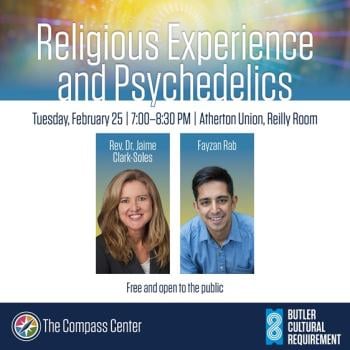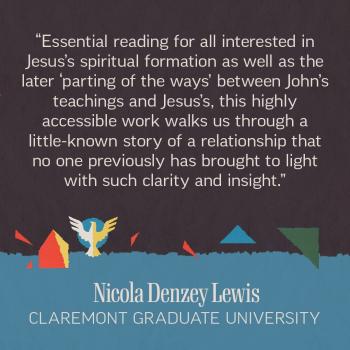In 2007 I read and reviewed an interesting book relevant to those interested in science and religious beliefs, namely Six Impossible Things Before Breakfast: The Evolutionary Origins of Belief
by Lewis Wolpert. It is a very balanced treatment of a potentially sensistive topic, which is identified by the book’s subtitle: The Evolutionary Origins of Belief. In other words, the book represents a perspective from evolutionary biology on why we believe the things we do, how we come up with and accept beliefs, and among other things why so many of us can seem at once so gullible in falling for new things and so unwilling to change beliefs we already have.
Once again there was an interesting convergence between my reading this book about our beliefs, and the mention on TV yesterday that con artist Peter Popoff is back. Asking what in our evolutionary history and our biological makeup leads us to draw conclusions, evaluate and accept or reject arguments and evidence, connect experiences, and so on, is not only appropriate but important and fascinating.
Wolpert introduces the subject gently, focusing on concrete examples and studies showing how evidence contrary to beliefs we already hold is often rejected, and how when presented with two pieces of evidence we instinctively focus on the evidence supporting beliefs we already hold (see e.g. pp.20-21). The way in which we incorporate new information into our belief systems and worldviews is not straightforward, by any means, and we are probably all much less open minded than we would like to believe.
When treating the topic of religious beliefs, it is important to note that Wolpert focuses on what may be called “belief that…”, i.e. assent to certain propositions. Such beliefs are indeed a part of any religious tradition and religious worldview, and when it comes to propositional beliefs, religious believers are indeed susceptible to criticism for often maintaining adherence to propositions for which there is strong evidence to the contrary. Presumably that is why Peter Popoff can make a comeback – people so badly want to believe in the miracles and healings he claims to do that his exposure as a fraud can be explained away (as can one’s own failure to experience the promised miracle even after sending him thousands of dollars).
Many religious believers understand faith/belief to mean assent to propositions without evidence, or even against the evidence, but it is also important to note that belief can also be understood in Tillichian terms as “ultimate concern”. Our propositional beliefs ought, from a purely religious perspective, be open to revision. The Book of Job tells the story of someone who shared with his contemporaries the overly-simplistic view of God and rewards/punishments that still prevails in some circles today, that the righteous prosper and the wicked suffer. The story’s resolution comes when God appears to address Job and his friends, and says that he is not pleased with the way the “friends” sought to defend traditional propositions about God, but is more pleased with Job’s willingness to question them in light of experience. If our propositional beliefs are based on a literalistic reading of Scripture and/or are not open to revision in light of new information and circumstances, then we are in a seriously problematic and perilous situation: no one, not even God, is allowed to teach us anything!
One reason why science has a hard time persuading us to change our minds about things is that science (contrary to the common misperception) does not simply accord with common sense. On the contrary, much of science’s conclusions run counter to common sense. That objects can attract one another in a vacuum (i.e. gravity), that the earth moves, that organisms adapting over time can eventually end up looking and being radically different when all we see are seemingly static organisms around us (this is comparable to the way we see languages as they are spoken today, so that it is hard to imagine that a modern, apparently static language such as French or Italian, could have evolved from the common ancestor Latin). If we bring quantum physics into the discussion, common sense gets thrown out much more radically! Science’s conclusions are often extremely counterintuitive, and it is not because of common sense that they are accepted or rejected in the scientific community. It is because of evidence.
Many religious believers have taken refuge in postmodernism, suggesting that no evidence can clearly determine a conclusion: everything is interpretation, everything is perspective. This seems unpersuasive, because it suggests that there are only two options, all or nothing. The truth is that in history, in science, in Biblical studies, in whatever field one might mention, some things will be certain, some will be probable, and some will be genuinely uncertain. But radical uncertainty is not a necessary implication of either modern science, or modern philosophy, or of anything else. Some religious believers will also take the appreciation of myths and stories in our postmodern setting as an excuse to remain immature in their faith – at the stage that Ricoeur calls the first naivite. Maturity, however, only comes with the second naivite: with having questioned and thought critically about one’s immature beliefs, and having come to appreciate them in a genuinely different and deeper way after having had their absoluteness challenged. Science is a wonderful tool in helping religious believers reach maturity, because many religious believers hold to propositional beliefs the factuality of which is at best far from certain, and in some cases evidently untrue. Science can help get us to adolescence, a necessary stage in maturing – but quite obviously not the final one, a point to which we must return shortly.
Scripture-oriented religions have a tendency to get stuck at the point in the development of human thought at which their Scriptures were completed. The Judeo-Christian tradition had got beyond the multiple gods of storm, of sea, of fertility, to the insight that all of these stem from one and the same source. This is a remarkably important insight, one that made a positive contribution to the development of science, and indeed could be said to have gotten there first! But having realized that our ideas of God developed over time, often integrating not only new spiritual and theological information but also new information about the world around us, why should we stop and be content with a concept of God that simply rolls the various deities of polytheism into a single God but leaves it at that? Aren’t we still viewing the world in the same way, treating storms and earthquakes as signs of divine favor, just now of a single God whose reason for punishing us is moral rather than merely capricious? It is a help to religion that science can show us meteorology and relieve us of the need to interpret every wind and wave that does us harm as a divine action. On the other hand, acknowledging that some things just happen appears, from Wolpert’s research, to be absolutely one of the hardest things for human beings to believe. We instinctively seek meaning in events, causal explanations, and we are apparently alone in the animal kingdom in doing so.
Wolpert’s book shows that all sorts of beliefs, but in particular religious beliefs, are expressions of perspectives that are rooted in our biology and more specifically in our brains. I found myself wondering whether and to what extent it is then possible to view the world differently. I certainly seem to have been able to get beyond looking for causes of last year’s hailstorm that are anything other than meteorological, however tempting it might be to believe that God wanted to give me a new roof, or perhaps punish the insurance company. Evolutionary biology shows that we have certain tendencies, but what impresses me most is that we can actually overcome some of our tendencies. It is here that religion is to be appreciated: our instincts regularly drive us towards self interest and self-preservation, and yet often times (because of our beliefs!) we may set aside our natural instincts of and act in ways that may even be heroic.
Religion, at least as I view it, is about transcendence. In denying the existence of the gods of the nations, we may actually have set ourselves up to ignore the realities to which such language is a symbolic pointer. Things like cultures are genuine instances of transcendence – anyone who has felt abhorrence at something in their own culture and sought to change it will know that it is not merely something that can be changed on an individual level. It is something that grabs hold of individuals and refuses to let them go, possessing them like a demon and potentially leading them to do evil that were it simply a case of individual behavior they might never have consented to. I still find helpful, whatever their shortcomings, Rudolf Bultmann’s writings about demythologization. If we simply peel away and cast aside certain beliefs on the literal/factual level, we may be taking the wrong approach. Rather, it is best to ask what insight into the human experience a story offers, and then to ask how we may re-express that insight in the context of our worldview today, which certainly will incorporate scientific information and perspectives, but need not be limited only to what science can tell us. It is to Wolpert’s credit that, even though he is certainly a skeptic of religion (and not merely of specific religious beliefs or affirmations), he gives due space to those who do not find religion and science to be fundamentally in conflict (see pp.212-216 for both perspectives).
Religion, for some, is about beliefs, and holding to them at all costs, often seeming extremely arrogant in the process. For others, religion is about almost precisely the opposite: that we do not know, that we see in a mirror darkly, that we are dependent on something and someone greater than ourselves, that our human perspective is incapable of explaining and understanding it all. For those of us of this latter perspective, science is not a threat to our faith. On the contrary, it confirms to us how much we still have to learn, and at the same time it awes us with new and deeper understandings of some of what had once been simply mysteries.
Wolpert’s conclusions are admirably balanced and fair. He states (pp.218-219) that, having seen the benefits of religious beliefs in his son’s life, he would never try to persuade him to abandon those beliefs. His one exception to a willingness to allow people to hold whatever beliefs they choose “but with a fundamental provision that those beliefs must be reliable if they lead to actions that affect the lives of other people” (p.219). I would go one step futher, and suggest that we need to find ways of helping religious believers think critically about their propositional beliefs, their doctrines and dogmas, while also understanding that disproving and changing one’s mind about such matters does not (or at least need not) represent a loss of one’s faith. Faith, in the Biblical tradition, is an attitude of trust and dependence, and not first and foremost assent to propositions, incredible or otherwise. It is the same challenge professors meet in every classroom – to help students realize that they can distinguish between their beliefs and their own selves, and that in daring to question and think critically about their beliefs and viewpoints they are not being untrue or unfaithful to their own selves, or for that matter to God.
Wolpert’s final conclusion is wonderful, and worth quoting at least in part here: “Religious and mystical beliefs will continue for the foreseeable future to be held by millions of people, not only because mysticism is in our brains, but because it gives enormous comfort and meaning to life…We have to both respect, if we can, the beliefs of others, and accept the responsibility to try and change them if the evidence for them is weak or scientifically improbable. The loss of religious beliefs could have very serious consequences, and so could the enforcement of those beliefs on others. It is the action based on beliefs that ultimately matters, and respect for the rights of others is fundamental” (p.220).














